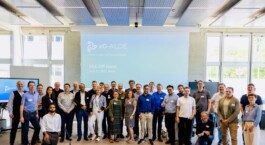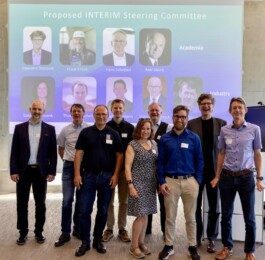



The xG-ALOE initiative has officially launched with a kick-off event in Berlin, hosted by the Fraunhofer Heinrich-Hertz-Institut (HHI). The initiative builds on the successful outcomes of the CampusOS project, which was funded by the German Federal Ministry for Economic Affairs and Energy (BMWE) over the past three years and concluded on March 31, 2025. Following a recommendation by the BMWE, xG-ALOE was created as a long-term platform to further develop and sustain the technologies, results, and partnerships established in CampusOS. “The xG-ALOE initiative presents an exciting opportunity to further develop the outcomes of the CampusOS project, paving the way for long-term success and innovation for the benefit of the vertical industry.” says Dr. Frank Hofmann from Robert Bosch GmbH.
Bringing together experts from around 40 organizations in industry, academia, and the start-up sector, the alliance officially began its work. A strong Steering Committee was elected, represented by:
Prof. Slawomir Stanczak (Fraunhofer HHI), Prof. Frank Fitzek (TU Dresden), Prof. Hans Schotten (RPTU), Prof. Axel Sikora (Offenburg University of Applied Sciences), Gabriele Schrenk (EANTC), Dr. Frank Hofmann (BOSCH), Thomas Höschele (CampusGenius), Dr. Slawomir Pietrzyk (IS-Wireless), and Dr. Bernd Schröder (brown-iposs).
In addition, the xG-ALOE Board was established and will be represented by Dr. Bernd Schröder (brown-iposs), Dipl.-Ing. Leszek Raschkowski (Fraunhofer HHI), and Dr.-Ing. Martin Kasparick (airpuls). The event also focused on outlining strategic goals for the initiative and introduced key working group topics:
“The xG-ALOE Alliance is a playground for innovation, collaboration, and cutting-edge technology. We connect pioneers from across the industry to develop, test, and validate the next generation of solutions and use cases,” says Prof. Slawomir Stanczak, Head of the Wireless Communications and Networks Department at Fraunhofer HHI.
xG-ALOE sees itself as a hub for innovation, knowledge exchange, and collaborative development in Open RAN and private 5G networks. The initiative particularly aims to support small and medium-sized enterprises (SMEs) and start-ups by offering the opportunity to test and further develop new technologies, either independently or in collaboration with academic and industrial partners. Dedicated test and demonstration environments will allow for early evaluation of prototype components and services.
Participating companies will benefit from continuous insights into the latest developments and trends in 5G and 6G research. Joint test campaigns (“Plugfests”) will play an important role, especially in integrating Open RAN components. These collaborative activities are designed to help smaller players overcome practical challenges more efficiently.
“xG-ALOE must be ambitious and pragmatic at the same time. Although or precisely because the market environment for - in particular - 5G private networks currently appears unfavourable, there is a need to bundle efforts for open architectures and systems. This will require perseverance and persistence. Convinced that open architectures and interfaces are necessary (not only) for business networks, as they are a key element for the realisation of European sovereignty in this area, it is important to bring the perspective of established SMEs in this field into the initiative. By my contributions to the board and the steering committee I want to contribute to making xG-ALOE a success.” says Bernd Schröder, founder and CEO of brown-iposs.






A CampusOS initiative supported by Fraunhofer HHI as host.
Fraunhofer Heinrich-Hertz-Institut, HHI
Einsteinufer 37, D–10587 Berlin
A CampusOS initiative supported by Fraunhofer HHI as host.
Fraunhofer Heinrich-Hertz-Institut, HHI
Einsteinufer 37, D–10587 Berlin